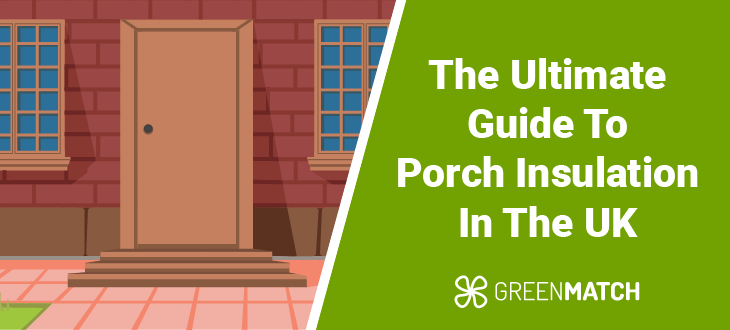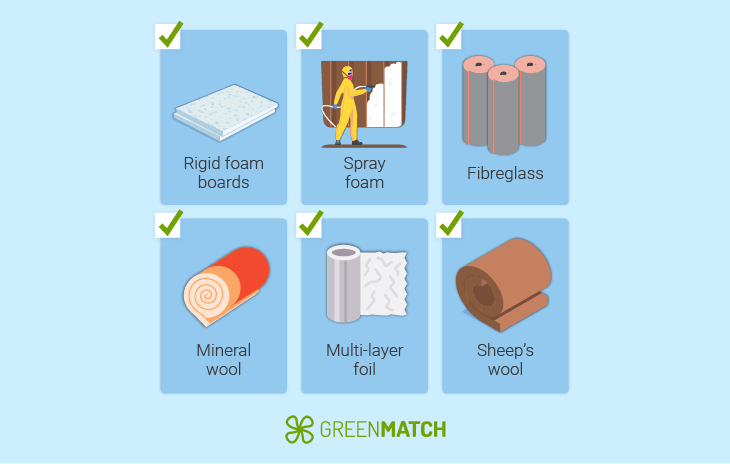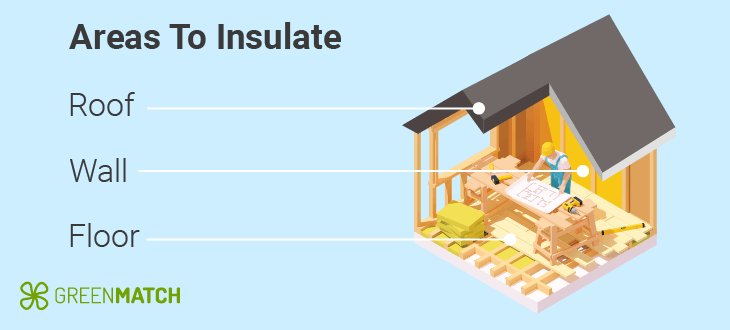Answer these simple questions and we will find you the BEST prices
Which type of solar quotes do you need?
It only takes 30 seconds
100% free with no obligation

Get Free quotes from insulation specialists near you

Save money by comparing quotes and choosing the most competitive offer

The service is 100% free and with no obligation
- GreenMatch
- Insulation
- Porch Insulation
Porch Insulation: Materials, How to Insulate & Costs (2024)


- Insulating a porch can reduce energy bills by up to £315 annually by preventing heat loss and reducing the strain on your heating system.
- Material costs for a typical 3m² porch range from £9 to £66 per m², with professional labour adding approximately £150 to £300, depending on the porch’s complexity.
- When insulating, focus on critical areas like the roof, walls, and floor. Seal gaps around windows and doors to block drafts.
Thinking about insulating your porch? If so, you’re not alone. Insulating a porch can turn a draughty, underused space into a cosy, practical extension of your home. Not only does it boost comfort, but it also enhances energy efficiency and adds value to your property.
According to Energy Savings Trust, annual energy bills are set to rise 10% to an average of £1,717, or an extra £12 per month. Insulating areas like your porch can help reduce heat loss, keep your home warmer, and reduce rising heating costs.
This guide will explain the benefits of insulating a porch, the best materials, and critical steps to insulate areas like the roof, walls, and floor. We’ll also discuss insulation costs and the added value porch insulation can bring to your home.
Ready to begin? Multiple professional quotes can help you find the best option for your budget. Fill out our quick form, and we’ll connect you with up to 3 free quotes from accredited installers in your area, saving you the time and hassle of doing it alone.
- Describe your needs
- Get free quotes
- Choose the best offer
It only takes 30 seconds



Why insulate a porch?

Here's why adding insulation to your porch can be a great investment:
- Combat heat loss: An uninsulated porch can be a major source of heat loss, especially in older homes with single-skin brick walls. Porch insulation, particularly in the roof and walls, prevents warm air from escaping, helping your home retain more heat during colder months. This means less strain on your heating system—up to £315 saved in energy bills per year!
- Create a cosy space year-round: Without insulation, a porch can be cold and uncomfortable in winter and unbearably hot in summer. Proper insulation transforms it into a space you’ll want to use all year, whether as a mudroom, extra storage area, or even a sunroom. Adding roof insulation ensures consistent temperatures so you can enjoy this home extension in any season.
- Reduce dampness and condensation: UK weather is notorious for dampness, which can creep into uninsulated areas like a porch. Insulation is a barrier against condensation and moisture, protecting your belongings and the porch structure. Insulating your porch reduces the likelihood of damp-related issues, which can save on repair costs in the long run.
- Boost your home’s energy efficiency: A well-insulated porch isn’t just about personal comfort; it’s about cutting down on wasted energy. Reducing heat loss in areas like the porch contributes to energy savings and a smaller carbon footprint. Porch insulation is an eco-friendly choice that aligns with the UK's goals for greener homes.
- Add value to your property: Insulating your porch makes your home more comfortable and increases its market appeal. Potential buyers often seek energy-efficient features; a well-insulated porch adds that extra touch. This simple improvement can make your home more attractive to future buyers.
Best insulation materials for porch insulation

As mentioned earlier, choosing proper insulation for your porch has multiple benefits, especially for single-skin brick constructions. Now, let’s take a look at the different insulation materials to consider:
Rigid foam boards
Rigid foam boards (PUR or PIR) are best suited for insulating porch walls and roofs. They offer high insulation power in a thin layer, making them perfect for limited spaces. They are water-resistant, which helps prevent dampness, and are easy to cut and fit, making them suitable for DIY projects and professional installations.
Spray foam insulation
Spray foam insulation is perfect for filling gaps, corners, and irregular spaces where other insulation types might struggle. This material expands to fill any space, creating an airtight seal that prevents heat from escaping through gaps. It is also highly resistant to moisture, reducing the risk of mould and dampness, and provides additional soundproofing for a quieter porch.
Fibreglass
Fibreglass insulation is best used in porch roof areas with a protective covering or where it can be installed behind panels. This insulation type is affordable and lightweight, making it ideal for budget-friendly projects. It also provides solid thermal protection, helping keep the porch warm, especially during the colder months.
Mineral wool insulation
Mineral wool is ideal for porch walls and roofs that need additional fire protection and soundproofing. This insulation is naturally resistant to fire, mould, and moisture, which makes it a durable choice for damp-prone areas. It also has excellent soundproofing qualities, which can help reduce noise if your porch is near a busy street, and is highly breathable, reducing condensation risks.
Multi-layer foil insulation
Multi-layer foil insulation is suitable for compact porch spaces, such as walls and roofs, where space is limited. This insulation reflects heat into the porch, reducing heat loss and keeping the area warmer. Its thin profile makes it easy to install and it is often used as an additional layer over other insulation types for extra effectiveness.
Sheep’s wool is ideal for eco-friendly insulation for walls and roofs that need breathability. This natural insulation material is highly breathable, helping to manage moisture and reduce the risk of dampness. It is also biodegradable and environmentally friendly, making it an excellent choice for eco-conscious homeowners who want effective thermal insulation without chemicals.
How to insulate a porch

Now that you are aware of the suitable materials, let’s take a look at the key areas to focus on for effective insulation: the roof, walls, floor, and sealing gaps.
- Roofs: Attach rigid foam boards or fibreglass between the roof joists to insulate the roof to create a strong thermal barrier. If space is limited, multi-layer foil insulation can be used as it’s thin and reflective, helping keep warmth inside. Once the insulation is in place, secure it with a protective layer like plasterboard for a polished look.
- Walls: When insulating walls, particularly single-skin brick walls, install rigid foam boards or mineral wool on the inner side, either adhered directly or within a stud frame. Cover with plasterboard to improve thermal efficiency and achieve a smooth finish. When renovating, insulation must meet a U-value of 0.3 W/m²K or lower for energy efficiency.
- Floor: Before installing the flooring, place a layer of rigid foam board or insulating underlayment to insulate the floor. This helps block cold from rising through the ground, keeping the porch warmer. Ensure the insulation fits snugly along the edges to prevent heat loss around the perimeter.
- Sealing gaps: Use spray foam insulation to fill larger gaps or cracks around windows, doors, and corners, and apply weatherstripping on smaller gaps around frames to block drafts. This step reduces heat loss, making the porch more airtight and comfortable. Draught-proofing can save around £40 per year in Great Britain and £50 per year in Northern Ireland.
While minor tasks like sealing gaps may be manageable for DIYers, a professional can handle full roof, walls, and floor insulation. A qualified installer ensures proper insulation, maximises energy savings, and provides peace of mind with a professional guarantee. There are also building regulations to consider.
We can connect you with up to 3 free quotes from professional insulation installers in your area. Avoid the hassle of spending hours researching and comparing options. Just fill in our quick 30-second form, and we’ll take care of the rest!
- Describe your needs
- Get free quotes
- Choose the best offer
It only takes 30 seconds



How much does it cost to insulate a porch
The cost of insulation, specifically for a porch, can vary based on the materials chosen, the size of the area, and installation requirements. For UK homeowners, insulation material costs for an average-sized 3m2 porch range from £9 to £66 per m², with labour costs added if a professional installer is hired.
Here’s a table with estimated material costs for 3 m²- and 6 m² porch sizes.
| Insulation material | Cost per m² | Cost for 3 m² porch | Cost for 6 m² porch |
|---|---|---|---|
| Multi-layer foil | £3 – £4 | £9 – £12 | £18 – £24 |
| Rigid foam boards | £5 – £15 | £15 – £45 | £30 – £90 |
| Fibreglass | £10 | £30 | £60 |
| Mineral wool | £13 – £17.50 | £39 – £52.50 | £78 – £105 |
| Sheep’s wool | £17.50 – £22 | £52.50 – £66 | £105 – £132 |
| Spray foam | £21.50 | £64.50 | £129 |
- Typical UK insulation labour costs generally range from £15 to £30 per hour, and depending on the porch’s size and complexity, a professional can take 5–10 hours. This leads to approximately £150 to £300 for labour. This cost ensures proper fitting, which is crucial for effectiveness, especially with single-skin brick walls.
- Extra expenses may apply for sealing gaps and adding vapour barriers, often costing an additional £50 to £100 depending on the porch’s condition.
Is it worth insulating a porch?
Yes—insulating your porch is a smart investment, improving comfort, lowering energy bills, and protecting against dampness. Here’s a look at the benefits of this type of home insulation:
- Year-round comfort: Insulating your porch helps maintain a stable temperature, keeping it warmer in winter and cooler in summer. For example, adding insulation to walls in UK homes can reduce heat loss by up to 45%, making a noticeable difference in everyday comfort.
- Lower energy bills: Insulating walls, roofs, and floors reduces heating demands and can cut energy costs significantly. Wall insulation in a typical UK home can save around £315 per year in energy bills. While porches may have smaller areas, this shows the potential for savings when insulating areas otherwise exposed to the cold.
- Damp protection: Insulation acts as a barrier against moisture, reducing the risk of mould and condensation—common problems in UK homes. Mineral wool, which is often used in insulation, is naturally moisture-resistant, helping to protect your porch and belongings from dampness and prolonging the lifespan of the porch structure.
For the best results, professional installation is recommended. Proper fitting by a professional ensures optimal insulation performance and long-term savings. Additionally, many professionals offer warranties on their work, giving you peace of mind that your insulation is built to last.
We can connect you with up to 3 free quotes from trusted insulation professionals in your area. Avoid the hassle of researching and comparing options yourself. Simply fill out our quick form, and we’ll do the rest!
- Describe your needs
- Get free quotes
- Choose the best offer
It only takes 30 seconds



FAQ
To keep a porch warm in winter, insulate the walls, roof, and floor to retain heat and seal gaps around doors and windows to prevent drafts. Adding a heater or using thermal curtains can also help maintain warmth.
Insulate a porch by adding insulation to walls, roof, and floor using materials like rigid foam boards, mineral wool, or multi-layer foil. Seal gaps around windows and doors to enhance energy efficiency.
The best insulation depends on your porch’s needs, but rigid foam boards, mineral wool, and spray foam are effective for walls and roofs. Multi-layer foil insulation works well for compact spaces and floors.
Insulating a porch reduces heat loss, lowers energy bills, and makes it comfortable year-round. It’s a valuable investment, especially for homes in colder UK climates.

Nicole Bea Kerr is a content writer for Greenmatch, leveraging her experience in B2B journalism and editing. She is interested in bringing more awareness to sustainability through informative narratives.
We strive to connect our customers with the right product and supplier. Would you like to be part of GreenMatch?

- Describe your needs
- Get free quotes
- Choose the best offer
It only takes 30 seconds



